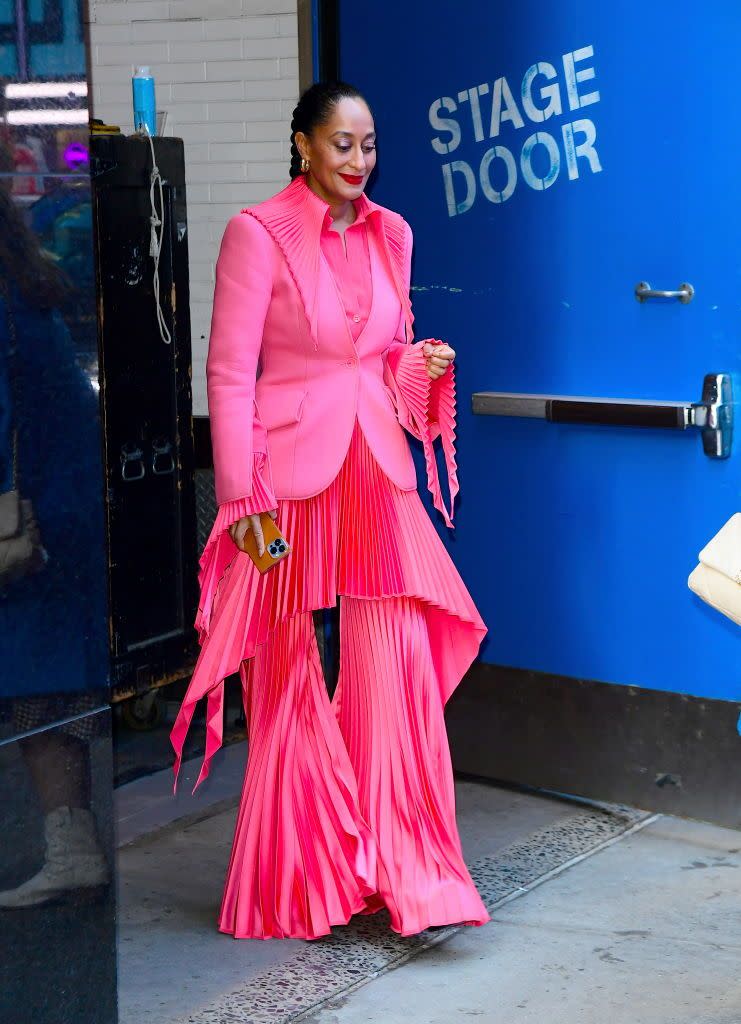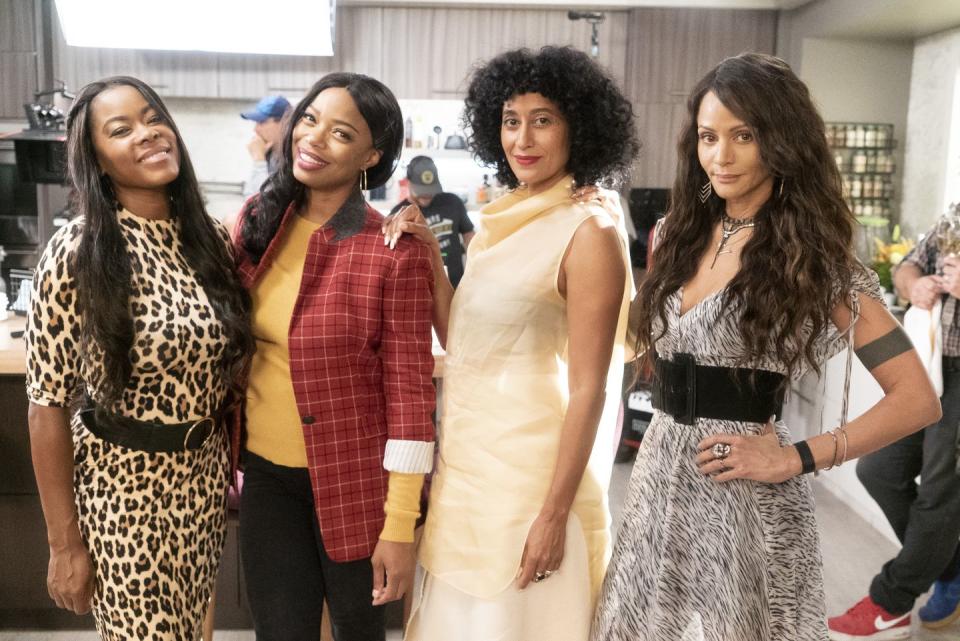Tracee Ellis Ross Tells Gayle King That “The Hair Tales” Is a Love Letter to Black Women

- Oops!Something went wrong.Please try again later.
- Oops!Something went wrong.Please try again later.
Gayle King and Tracee Ellis Ross sat down for an interview as part of the Celebrate Black Style Summit, a gathering that is amplifying Black voices in fashion, beauty, business, and entertainment and was created by Oprah Daily’s parent company’s affinity group, Hearst Black Culture.
When you hear the name Tracee Ellis Ross, what comes to mind for you? Comedian and actress? Fashion icon? Or what about CEO? The multi-hyphenate, who will soon celebrate her 50th birthday, is thriving in all areas of her life—and Ross is not slowing down anytime soon.
Gayle and Ross's conversation took place just a week before the release of Ross’s latest project, The Hair Tales, which she hosted and executive produced with Oprah and Michaela Angela Davis. Read a recap of their talk below.
Gayle: I want to start with fashion because this is a very style-oriented group. So how do you decide what to wear, Tracee? Because I’m always fascinated.
Tracee: It’s just how I feel and how I’m feeling about my body. My weight fluctuates all the time. So sometimes I want to feel more covered. Sometimes I want to feel sexier. It just depends. But clothing started out as armor for me.
G: What do you mean?

T: It just was one of the ways I protected myself and kept the world at bay. It’s one of the ways I express my creativity. But now it’s how I wear my insides on my outside, and I love it. There’s a couple things that will always be true. I will always spend money on clothes. In college, it was at the secondhand stores, and I would do vintage shopping and J.Crew back then. Now it’s a little higher-end than that. There will always be dirty dishes in the sink.
G: You said something interesting. You said “keep the world at bay.” Why did you need to keep the world at bay?
T: Well, I was very shy.
G: Were you? Seriously?
T: Yeah. My shyness manifested in a really big personality. So same thing. You can be a wallflower by saying nothing. You can also—no one can see you by being a big loud, joyful personality as well. I wouldn’t say that I’m shy, but I have a very anxious inside.
G: I want to talk about The Hair Tales because I can’t wait for you all to see it. It’s so good. It’s six different episodes, and you interview six different women talking about hair. But the opening line in Hair Tales is this: “Every kink, curl, and coil in a Black woman’s crown has a hair tale.” Isn’t that true? You also say you wanted to honor our beauty, our culture, our identity, and our humanity, and celebrate the truth of who we are through the wondrous world of hair. Wow.
T: So we’re using hair as a metaphor for our humanity and an organizing principle. But the truth is that Hair Tales is a love letter to Black women. That’s what we wanted it to be. That’s what it is. So often, our experience is told through the lens of struggle and hardship, and that is a part of the experience. But there’s also so much joy and so much beauty, and there’s so much worthy of celebration, connection, and conversation.
G: I never thought about all the different textures. You show a brush going through. You show it being braided. It’s tight shots and it’s slow motion and it’s different colors. I just looked at that and went, “Wow, we are so good.”
T: We are sold a lie about who we are. Our beauty is our soul’s fingerprint. We as Black women and as Black people in this country are sold this lie. I hope that Hair Tales can poke holes in that and really allow us to see ourselves and give us context. Our experience is always decontextualized. We don’t have time to see how we’re all so much the same and so different.
G: So how did you come up with a haircare line? Because you could have done fashion, too. Maybe that’s coming.
T: Maybe. Ten years ago.
G: What was the pitch for Pattern Beauty? Do you remember?
T: I wanted a line of conditioners that were bigger than the shampoo and that would meet the needs of the curly. At the time, I didn’t have this expression. It was people with textured hair. Now it’s the curly, coily, and tight textures.
G: Yes, yes, yes, yes.
T: I originally said it differently, but I have honed in on the language, which is that we are an active space that is centered around the celebration of Black beauty. The reason I say that, number one is that’s part of my life mission. But number two, I don’t believe that hair has a gender or a race. So it is for curly, coily, and tight textures. However, part of the mission is that we are centered around the celebration of Black beauty, so that we are the subjects and not the objects. That is the nearest expression. The subjects and not the objects of all of the content that we make.
G: Do you have any plans for Pattern?
T: Yes, we are entering a new area with Pattern.
G: Can you share at the moment?
T: I cannot. It’s another part of the dream. We launched in the U.K. That was a very big part of the dream, and now Cult Beauty. So we’re across Europe, but Pattern takes up a lot of time. I love being a CEO.
G: Now, Girlfriends was a success.
T: No, ma’am. Girlfriends was a success for Black people.
G: Yes.
T: When I got on to Black-ish to do my looping and my voice, the sound guy, this big NBC Universal guy, he was like, “Oh, my God. Where did they find you?” I was like, “What do you mean?”
T: He was like, “I mean, it’s like you’re so seasoned.” I go, “I was on a show.” He was like, “I mean, you weren’t the lead.” I was like, “No, no no.” Then he said, “Well it wasn’t on a network.” I was like, “Yeah, it was.” “But it wasn’t prime time.” Then I said, “Yeah, it was.” He was like, “It wasn’t a comedy.” I was like, “But it was.” He was like, “Well, I’ll have to look that up.”

G: Wow.
T: Girlfriends gave me an incredible career, and I loved that show. I was so proud of that show. But nobody knew when it was on. Now we get it on Netflix. It’s amazing. So many people are discovering it. I will say, though, because if we’re going to talk about dating, I don’t know if you guys noticed, if you go back, but I have spent the 20 years since Girlfriends unlearning the fact that Joan’s existence was about trying to get chosen by a man.
G: Shouldn’t it be our choice?
T: Yes. That’s why I say I’m the chooser. I don’t have to wait to be chosen.
G: Yes, yes, yes.
T: But I’ve spent so much time learning that. Not only that, but constantly doing speeches and speaking publicly about that because that wormed into my head, too. I didn’t learn that in my family. I learned that because for eight years, for 176 episodes, that’s the language I was speaking. Language has that power. It made me constantly, made me feel like I was less than. I did a speech about it. My life is mine. The fact that I have worth without a husband, without a child. I am a worthy human being. Not even a woman—a human being. I’m worthy because of the ideas in my head, the feelings in my heart, and who I am as a human being, the whole picture.
T: It doesn’t have anything to do with me in context. I have constantly talked about that in terms of Bow Johnson, that she was a full woman. But yeah, that’s the hard part, looking back.
G: People will say, “Gayle, how was Tracee Ellis Ross?” I’ll say, “Tracee Ellis Ross is...” You finish the sentence.
T: She’s good. She’s good.
G: She is good. Thank you.
To watch their full conversation, visit http://hearstblackculturesummit.com/.
You Might Also Like

